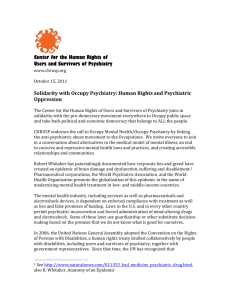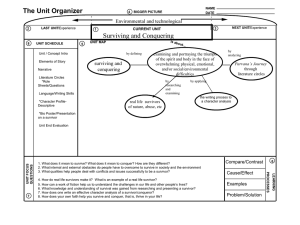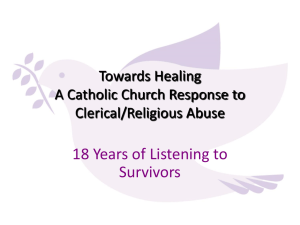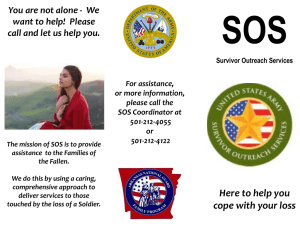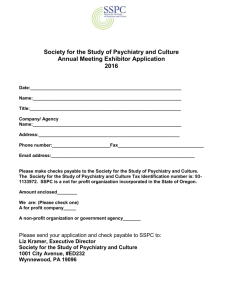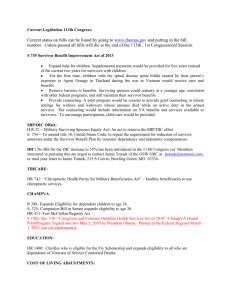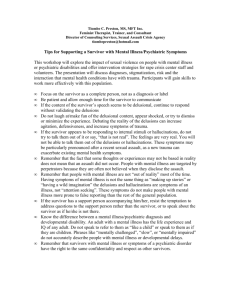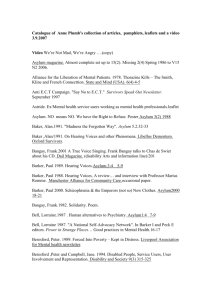To first announcement about this event from organizers
advertisement
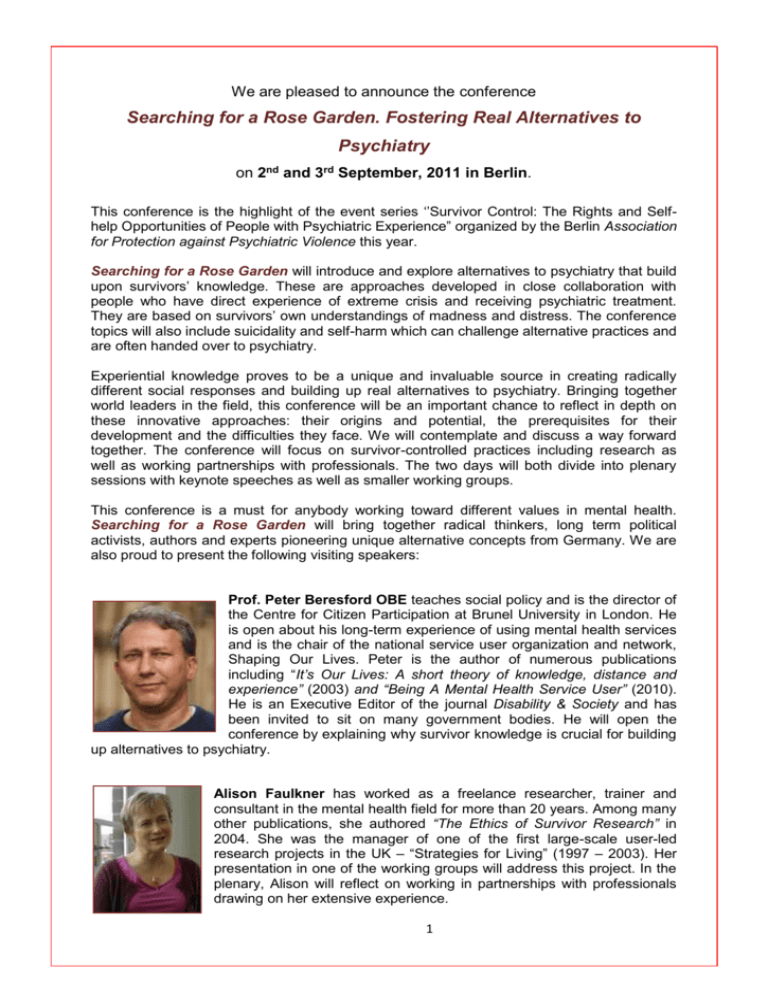
We are pleased to announce the conference Searching for a Rose Garden. Fostering Real Alternatives to Psychiatry on 2nd and 3rd September, 2011 in Berlin. This conference is the highlight of the event series ‘’Survivor Control: The Rights and Selfhelp Opportunities of People with Psychiatric Experience” organized by the Berlin Association for Protection against Psychiatric Violence this year. Searching for a Rose Garden will introduce and explore alternatives to psychiatry that build upon survivors’ knowledge. These are approaches developed in close collaboration with people who have direct experience of extreme crisis and receiving psychiatric treatment. They are based on survivors’ own understandings of madness and distress. The conference topics will also include suicidality and self-harm which can challenge alternative practices and are often handed over to psychiatry. Experiential knowledge proves to be a unique and invaluable source in creating radically different social responses and building up real alternatives to psychiatry. Bringing together world leaders in the field, this conference will be an important chance to reflect in depth on these innovative approaches: their origins and potential, the prerequisites for their development and the difficulties they face. We will contemplate and discuss a way forward together. The conference will focus on survivor-controlled practices including research as well as working partnerships with professionals. The two days will both divide into plenary sessions with keynote speeches as well as smaller working groups. This conference is a must for anybody working toward different values in mental health. Searching for a Rose Garden will bring together radical thinkers, long term political activists, authors and experts pioneering unique alternative concepts from Germany. We are also proud to present the following visiting speakers: Prof. Peter Beresford OBE teaches social policy and is the director of the Centre for Citizen Participation at Brunel University in London. He is open about his long-term experience of using mental health services and is the chair of the national service user organization and network, Shaping Our Lives. Peter is the author of numerous publications including “It’s Our Lives: A short theory of knowledge, distance and experience” (2003) and “Being A Mental Health Service User” (2010). He is an Executive Editor of the journal Disability & Society and has been invited to sit on many government bodies. He will open the conference by explaining why survivor knowledge is crucial for building up alternatives to psychiatry. Alison Faulkner has worked as a freelance researcher, trainer and consultant in the mental health field for more than 20 years. Among many other publications, she authored “The Ethics of Survivor Research” in 2004. She was the manager of one of the first large-scale user-led research projects in the UK – “Strategies for Living” (1997 – 2003). Her presentation in one of the working groups will address this project. In the plenary, Alison will reflect on working in partnerships with professionals drawing on her extensive experience. 1 Beth Filson is co-author of Engaging Women in Trauma-Informed Peer Support - A Guidebook. As a survivor, she brings attention to the role violence and abuse play in the lives of people psychiatrically labeled and provides training to assist organizations in addressing the issue of re-traumatization. Beth currently works in Massachusetts to help providers engage in healing relationships with people who self-injure. She will present Shery Mead’s concept of intentional peer support and will also take part in a working group about dealing with self-harm. Maths Jesperson has been a regional officer of the Swedish national organisation of users and survivors of psychiatry (Riksförbundet för Social och Mental Hälsa - RSMH) since 1988. In 1995, he pioneered PO-Skåne, a professional, user-run organisation which now provides supported decision-making for hundreds of persons with severe emotional problems. Maths will give a presentation about the concept of the personal ombudsman - an example of supported decision-making according to Article 12 of the Convention on the Rights of Persons with Disabilities (CRPD). Clare Shaw, MA PGC, is a key figure in the UK self-harm survivor movement. A founding member of the STEPS self-help group for women who self-harm and the Liverpool-based radical campaigns group Mad Women, Clare has drawn from her academic background as well as her own personal experiences to inform her work and publications around issues including self-harm, sexual abuse and Borderline Personality Disorder. This combination of personal, academic and campaigning experience also informs Clare's work as teacher and trainer: in 2006, Clare co-founded harm-ed, a user-led selfharm training organisation. She will present a radically different understanding of self-harm. Terri Shaw is a qualified and experienced teacher who has provided training to staff in a wide range of services. Whilst practicing as a nurse Terri developed an awareness of the complexities involved in selfharm; however, her real interest and involvement of the issues stemmed from the experiences of her sister who self-harmed over many years. Since April 2006, Terri has worked with her sister Clare Shaw as a director and principal trainer within harm-ed. She and Clare will jointly present their work. Terry Simpson is a freelance consultant, trainer and writer on mental health issues. He was a founding member of Leeds Survivor Led Crisis Service, Leeds Mental Health Advocacy Group, and Leeds Survivors Poetry, Terry was the National Director of the UK Advocacy Network (UKAN), a survivor led group promoting advocacy, from 1993 - 2002. He has co-edited several books of poetry and stories by mental health survivors including “Doorways in the Night” (2004). Two of his play scripts about the mental health system have been filmed for use on Open University Courses. Terry will present the conception of the Pajaro Valley Sunrise Centre (California, USA) a project to help people come off psychiatric drugs, and he will also join a working group on partnership projects. 2 Dr. Peter Stastny is a New York based psychiatrist, documentary film maker and a founder of the International Network toward Alternatives and Recovery (INTAR). He has frequently collaborated with psychiatric survivors, including by spearheading peer specialist services and peer-run businesses, as well as research and writing projects. Examples are a book and major exhibit at the New York State Museum “Lost Cases, Recovered Lives: Suitcases from a state hospital attic” (together with Darby Penney); and the edited volume “Alternatives beyond Psychiatry (with Peter Lehmann). Currently he is working on developing alternatives for individuals experiencing serious crises and further investigating the roles of peers/survivors in providing services to their peers. Dr. Angela Sweeney has been involved in survivor research for nearly 15 years. She completed her PhD at the Service User Research Enterprise (SURE) at the Institute of Psychiatry at Kings Collage London on the topic of service user-defined outcome measures for continuity of care. Angela has written and presented extensively on the topic of survivor research, and is lead author of the book “This is Survivor Research” (2009). She now works at University College London on a study comparing hospital wards and crisis houses. David Webb completed the world’s first PhD on suicide by a suicide attempt survivor in 2006 and “Thinking About Suicide”, the book from his PhD, was published by PCCS Books (UK) in 2010. He has served on the board of the World Network of Users and Survivors of Psychiatry (WNUSP) and is International Representative for the Australian Federation of Disability Organisations (AFDO). He has represented both these organisations at various UN forums on the Convention on the Rights of Persons with Disabilities (CRPD). David will present a radically different approach to suicidality. Venue: Tagungshaus Alte Feuerwache, Axel-Springer-Straße 40-41, 10969 Berlin. Dates: Friday 2nd September from 10 am to 6 pm Saturday 3rd September from 10 am to 4 pm. Conference languages: English and German (simultaneous translation provided) Conference fee: 100 € (reduced rate 50 €, for unemployed free of charge). A detailed conference programme will be available soon at www.weglaufhaus.de. If you wish to attend, please register by filling in the attached form and sending it to kongress.weglaufhaus@web.de. As the number of places is limited early registration is strongly recommended. We are very much looking forward to seeing you at this unique event in Berlin! Please note that the pre-conference event for service users/survivors only will be held on 1st September from 10 am to 5 pm. This event will be in German language with limited possibilities of translation. Venue: Der PARITÄTISCHE, Brandenburgische Str. 80 in 10713 Berlin 3
